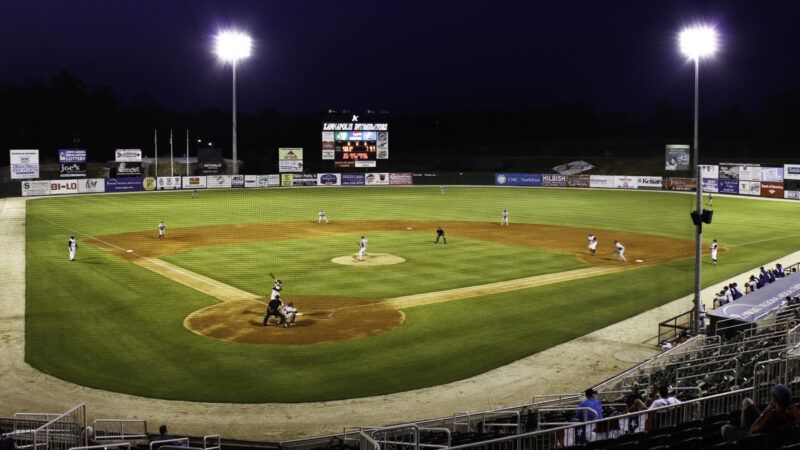A Minor League Baseball Bailout Would Be a Major Mistake
Taxpayers already spend millions to build minor league ballparks. Sen. Richard Blumenthal thinks they should financially support the teams, too.

Sen. Richard Blumenthal (D–Conn.) picked the perfect place to pitch a taxpayer-funded bailout for minor league baseball: A stadium that taxpayers already paid $66 million to build.
But now, Blumenthal says, more must be given to those who have already received so much. During a Monday press conference at Dunkin' Donuts Park in Hartford, Connecticut, Blumenthal said he would push for Congress to send $500 million to minor league clubs that are "on the verge of bankruptcy."
"Minor league baseball is in peril," Blumenthal said, according to the Hartford Courant.
"We need to come to their aide," he said. "We did it for restaurants, theater, live music. Baseball deserves it as much."
Blumenthal's not wrong about the financial problems that plague some minor league teams, but that's hardly a compelling reason for taxpayers to pick up the cost—especially when Blumenthal and others in Congress have opposed efforts by the baseball industry to address those issues privately.
The minor leagues did not play at all during 2020 due to the COVID-19 pandemic, even though Major League Baseball managed to squeeze in a 60-game season and playoffs late last summer. This year, minor league teams are beginning their seasons today—a month later than usual—but there will be fewer teams playing than in 2019. That's because MLB finally went through with a much-debated plan to reduce the number of affiliated minor league clubs that are used by major league teams to develop talent. Previously, each of the 30 MLB clubs had five or six minor league affiliates. Now, each will have just four.
It's a move that's meant to save the big-league clubs money, as it means paying fewer minor league ballplayers and financially supporting fewer clubs. Even though minor league teams are owned and operated mostly independently of their MLB parent organizations, the much richer big-league clubs provide a steady stream of revenue to their farm teams.
Blumenthal was one of several senators to object to MLB's plan to trim its list of official minor league affiliates. At a February 2020 press conference, he called the plan "unconscionable and inexcusable." Previously, he had called on Congress to revoke MLB's antitrust exemption (which isn't a bad idea on the merits) to punish the organization for its plans to cut some minor league teams.
But there's an obvious intellectual inconsistency here. In Blumenthal's ideal world, MLB should be forced to continue to operate more money-losing minor league teams and taxpayers should be forced to bail out those money-losing minor league teams.
Here's a better idea: maybe members of Congress should mind their own business and let baseball teams and leagues sort out their own finances.
Minor league baseball serves an important function to MLB as a way to evaluate young players and develop talent, so it's unlikely that the parent organizations would simply let their minor league teams go bankrupt. There is no need for the government to get involved—beyond allowing as many fans as possible to attend the games. That's the best lifeline for financially struggling teams.
It's bad enough that taxpayers are routinely and continuously put on the hook for the construction costs of privately owned baseball stadiums at every level. Study after study after study has debunked the idea that publicly funded stadiums are financially beneficial to anyone other than the team owners, who get free infrastructure for their business.
Blumenthal's plan would double down on that waste by asking taxpayers—many of whom would likely never choose to spend their money on tickets to minor league baseball games—to pay even more.
